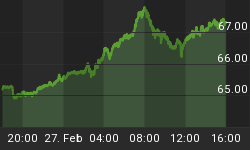Considering that the Shanghai Composite Index has fallen a little over 12% percent in 2010, making it the fifth worst performer this year among 92 indexes tracked by Bloomberg, it is being asked as to whether China is heading into bubble bursting territory and could this portend the spread of the Greek contagion to China? The short answer is no. The longer answer is as follows:
-
China's external debt is very manageable (Exhibit 2) and the country has massive foreign exchange reserves (Exhibit 3).
-
Exhibit 2: China: Total External Debt as a % of GDP

What China does have - and this is what worries people - is the hangover from a massive monetary stimulus last year, which is now unwinding. This has also added to short term debt which has increased and should be closely watched. China is seeking to slow the pace down, curtail but not strangle the flow of credit into the economic system, and maintain export growth. In addition, it is under pressure to let its currency appreciate.
-
Exhibit 3: China: Foreign Exchange, NSA, EOP, Mil USD

China's short term debt has grown, which though it is manageable, needs to be watched, especially considering this is where European OECD countries have thus far demonstrated the most risk.
-
Exhibit 4: China: Short-term Debt, 100 Mil. USD

-
-
The pullback in Chinese stock markets reflects growing concern about the government effort to manage the credit flow, but it must also be seen in the global context of investors being a little more cautious about risk trades. No matter how you cut it China is still a risky trade, especially when looking into the equity markets. The likelihood is that this a temporary pullback, but the year will be marked by more volatility some of which is related to global credit conditions, including worries over sovereign debt in OECD countries.
-
If China crashes and burns, this has major implications for global commodity markets from Australia and Indonesia to Brazil and Sudan. China is one of the largest consumers of global commodities and if it were to go off-line (or growth slump under 5%) there would be very pronounced knock-on effect throughout much of the Emerging Markets. By the way the IMF is forecasting Chinese growth of 10% for 2010 and 9.9% in 2011.
-
One of the areas that we watch closely is the banking sector and levels of non-performing loans. Although Chinese financial statements are probably not the best in the world, they can still provide a rough indicator as to direction. We expect that NPLs will increase through the year as the economy moves from the stimulus program to a greater reliance on stronger private consumption and investment. This will have to be watched closely as the year proceeds.
China has frequently been the subject of a debate between those who are waiting for the bubble to burst and recommend shorting the Middle Kingdom - on one side, and the believers in sustainability of economic growth - on the other. While we acknowledge that China faces substantial challenges and the poor performance of its stock markets recently reflects a slowdown in investment related to concerns vis-a-vis local risks, China still has considerable economic momentum, its economic management team is strong, and the government has been pro-active in dealing with many of the major economic challenges. Although it is easy to put China in the same sentence as Greece, the reality is starkly different in terms of the ability of policymakers to respond and the resources at hand. As for Chinese equity markets, they enjoyed an up year in 2009; 2010 is when they come back to earth. Until it can be proven that stronger private consumption and investment pick up the slack from the decline in public spending, China's stock markets are likely to continue to underperform, something that is only reinforced by the choppiness in international markets.















